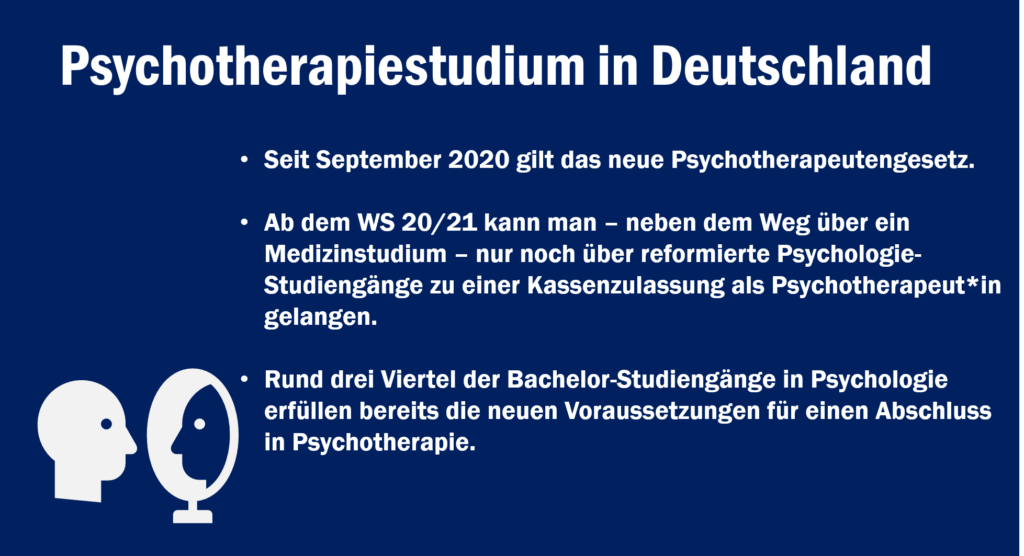 Bild: Gerd Altmann / Pixabay
Bild: Gerd Altmann / PixabayA new Psychotherapists’ Act came into force in September 2020. This new law also has an impact on the study of Psychology. Three-quarters of all higher education institutions (HEIs) now offer a reformed degree programme, enabling students to gain the academic training required to become a psychotherapist. A new information brochure published by the CHE Centre for Higher Education explains what else prospective students should pay particular attention to, and why going abroad to study Psychology on a programme with open admissions could now lead to a dead end.
Germany currently has around 34,000 insurance-approved psychotherapists. Previously, having a degree in Psychology or Education was the only prerequisite for embarking on subsequent training to become a psychotherapist. The new Psychotherapists’ Act, introduced in autumn 2020, now means that graduates of a relevant degree programme automatically receive their Approbation, i.e. the licence to practice psychotherapy. Such a licence enables the holder to work as a psychotherapist in a clinic, for instance. However, further training is required to become an insurance-approved psychotherapist.
“In the future, access to a Master’s programme in Clinical Psychology and Psychotherapy will be the bottleneck that regulates the number of psychotherapists. Other qualification pathways, e.g. via a degree in Education, will cease to exist,” explained Cort-Denis Hachmeister, psychologist and expert in access to higher education at CHE.
The new licensing regulations for psychotherapists require that students first pursue a so-called polyvalent Bachelor’s degree programme in Psychology. Only graduates of such a programme will now be eligible for admission to a Master’s programme in “Psychology focusing on Clinical Psychology and Psychotherapy”. Future first-year students that do not graduate from such a reformed Bachelor’s course will therefore be barred from studying Psychotherapy, even for the duration of their studies.
“It is therefore essential that prospective students who are specifically interested in psychotherapy check to see whether the psychology programme at their chosen university already meets the new criteria,” recommended Hachmeister.
According to research for the latest publication in the “CHE kurz + kompakt” series, three-quarters of the universities that offer psychology as a subject had a new polyvalent Bachelor’s degree in their range of programmes for the winter semester 20/21.
In addition to TU Dresden and the Martin Luther University Halle-Wittenberg, there was a delayed transition to the new system at all six universities in Baden-Württemberg. As a result, the new Bachelor’s programmes will probably not be offered there until the coming winter semester. Transitional arrangements are now to be created so that some psychology students who enrolled in winter semester 20/21 will be able to qualify for the corresponding Master’s programme after all. Eight other universities, including RWTH Aachen and the universities of Darmstadt, Lüneburg, Oldenburg and Erfurt, will not be offering a Bachelor’s programme in Psychology leading to a Psychotherapy programme at Master’s level in the near future. The reasons for this vary.


In this context, CHE Executive Director Frank Ziegele commented: “Reformed access to the professional field of psychotherapy has some positive aspects, such as the improved remuneration situation during the post-graduate further training phase. However, everything must be done to ensure that the transition phase does not result in a generation of students with uncertain employment prospects.” Transitional regulations or opportunities for post-qualification must be available to students in Baden-Württemberg, as well as other individuals who have already started studying Psychology, to ensure equal opportunities.
Psychology, currently being studied by more than 90,000 people, ranked sixth among the most popular subjects in winter semester 19/20. Due to high demand, almost all Psychology degree programmes in Germany have restricted admission, and Abitur examination grades play a major role in the selection process.
For those wishing to become a psychotherapist, however, enrolling on a Psychology degree programme with open admissions in a neighbouring country may now lead to a dead end: “Graduates can only progress with their studies if the degree programme taken abroad exactly matches the German Master’s degree programme in Psychotherapy. In the worst case, the Bachelor’s degree will not be recognised, and the student would have to retake certain modules or even the entire degree programme,” stated CHE expert Cort-Denis Hachmeister.
About the publication:
In the “CHE kurz + kompakt” series, each six-page edition provides answers to the key questions regarding the issue. The information package, available in pdf format, is rounded off with an annotated list of links and checklists for next steps and further investigation. In addition, maps of all federal states are available here online, showing where the new polyvalent programmes in Psychology are already being offered. The publication “CHE kurz + kompakt – Psychotherapie studieren” (CHE short + compact – Studying Psychotherapy) was written by Cort-Denis Hachmeister.
